Harnessing Research to Uphold U.S. Democracy and Rule of Law
A conference bringing together academics, policy practitioners, and journalists and cosponsored by Bright Line Watch, the World Justice Project, and Dartmouth’s Wright Center for the Study of Computation and Just Societies was held at Dartmouth College on December 2–4. The conference featured research presentations by top scholars from leading universities including Harvard, Stanford, Michigan, Chicago, and Emory. Topics included challenges to the democratic process and electoral integrity, the role of media and the information ecosystem, and judicial independence, integrity, and guarantees of the rule of law.
Bright Line Watch Update
With unprecedented legal investigations focused on former president Trump and some of his supporters, widespread concerns about the willingness of candidates to concede election losses and ongoing threats of political violence, the fall of 2022 is a pivotal moment for American Democracy. Join expert panelists from Bright Line Watch and the Democratic Erosion Consortium to learn about findings from the October and November 2022 waves of the Bright Line Watch expert surveys and discuss their implications for American Democracy.
This virtual panel was livestreamed on Monday, December 5. The recording of the panel can be accessed here.
Constitutional Hardball Roundtables

The third Bright Line Watch conference, “Constitutional Hardball Roundtables” (co-sponsored with the Weatherhead Research Cluster on Challenges to Democracy at Harvard University), was held at Harvard University on December 13th and 14th, 2019. The roundtables brought together leading scholars, politicians, and journalists to discuss how the descent into constitutional hardball affects American democracy and how best to respond to it. The questions addressed by the panelists included:
- How has constitutional hardball played out in partisan fights over voting rights?
- Can divided government function in a context of hyper-polarization?
- What are the appropriate standards for presidential impeachment?
- What accounts for the rise of constitutional hardball between Democrats and Republicans?
- In a polarized environment, how can courts be de-politicized?
Participants:
Aaron Belkin (Take Back the Court)
Jamelle Bouie (New York Times)
John Carey (Dartmouth College)
Daniel Carpenter (Harvard University)
Brian Fallon (Demand Justice)
Lara Flint (Democracy Fund)
Joe Goldman (Democracy Fund)
Richard Hasen (UC Irvine)
Gretchen Helmke (University of Rochester)
Will Howell (University of Chicago)
Susan Hyde (UC Berkeley)
Sanford Levinson (UT Austin School of Law)
Steven Levitsky (Harvard University)
Dahlia Lithwick (Slate)
Sarah Longwell (The Bulwark)
Jane Mansbridge (Harvard University)
Evan McMullin (Stand Up Republic)
Russell Muirhead (Dartmouth College)
Brendan Nyhan (Dartmouth College)
Jack Paine (University of Rochester)
David Pozen (Columbia Law School)
Jamie Raskin (U.S. Congress)
Mitchell Sanders (Bright Line Watch)
Maya Sen (Harvard University)
Theda Skocpol (Harvard University)
Susan Stokes (University of Chicago)
Mark Tushnet (Harvard Law School)
Keith Whittington (Princeton University)
Benjamin Wittes (Lawfare)
Democracy’s resilience: Is America’s democracy threatened?
The second Bright Line Watch conference, Democracy’s resilience: Is America’s democracy threatened?, was held at The Brookings Institution on May 1, 2018. In the aftermath of the 2016 election and during the tumultuous first year of the Trump presidency, observers across the political spectrum have struggled to anticipate the likely consequences for American democracy. Never before has a sitting president so harshly questioned the integrity of elections, challenged the separation of powers, and verbally threatened the freedom of the press. Partisan polarization is at an all-time high, public trust at a historic low. For many Americans, democracy seems more imperiled now than at any time in living memory. And similar problems are afflicting other democracies around the world. The Brookings Institution and Bright Line Watch brought together the authors of four prominent new books to weigh in on the status and prospects of America’s democracy.
One Nation After Trump by E.J. Dionne, Norm Ornstein, and Thomas Mann
How Democracies Die by Steven Levitsky and Daniel Ziblatt
The People vs. Democracy by Yascha Mounk
Anti-Pluralism: The Populist Threat to Liberal Democracy by Bill Galston
Each book offers its own unique look at how we arrived at this moment, with an American president who is singularly transgressive of democratic norms, and how the country might best move forward. The authors discussed their books and joined a panel of experts to further examine the status of American democracy and solutions to ongoing challenges facing political institutions in the United States. Following the discussion, the panel took questions from the audience.
How Do Democracies Fall Apart? (And Could It Happen Here?)
The first Bright Line Watch conference, How Do Democracies Fall Apart? (And Could It Happen Here?) was held at Yale University’s MacMillan Center on October 6, 2017. Conference papers are available here. Videos are available of all sessions: welcome, session 1, session 2, session 3.

